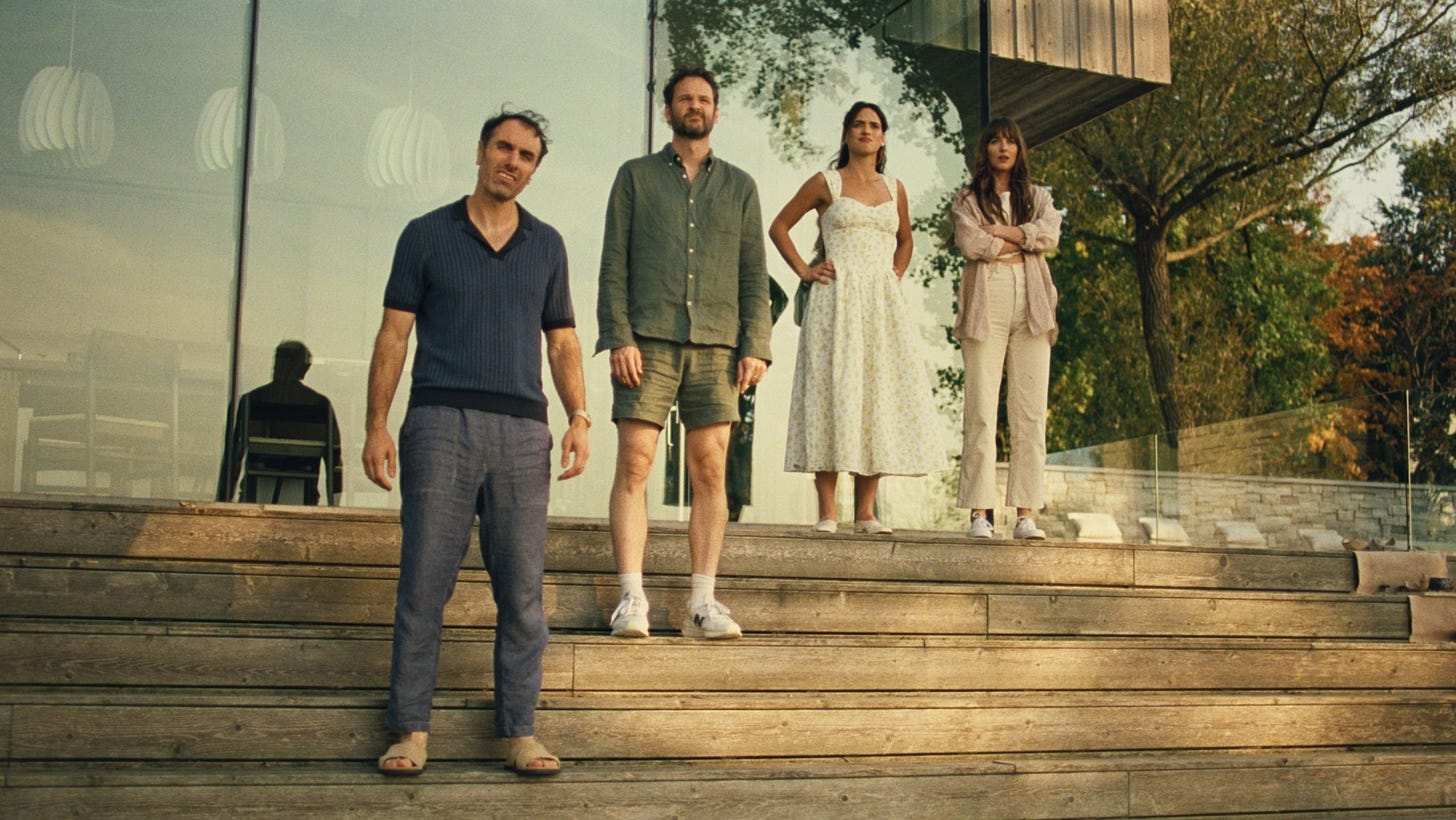Spoilers ahead.
About midway through Michael Angelo Covino’s Splitsville, there’s a short scene where Jason Segal-esque schlub Carey (Kyle Marvin), a gym teacher, is directing school drop-off traffic while wearing a bizarre white sweater. It’s knit but not cable knit, which would have been out of place climate-wise but still within reason for the character1. This sweater, though, is made with fluffier, shinier yarn and a looser weave. Compared with Carey’s other clothes, it looks a little young, a little Bushwick-y, a little, well, queer, especially on someone like him. If Splitsville hadn’t already made it abundantly clear that he is a married middle-class straight man in his mid-to-late thirties, you might wonder if something else was going on.
I think of this scene as an encapsulation of Splitsville’s whole thing, which is about what happens when a group of straight marrieds pre-empts what was once known as a midlife crisis by experimenting with an arrangement that reads a little, well, queer—with similarly unflattering results23. After Carey’s wife, Ashley (Adria Arjona) reveals she’s been unfaithful and asks for a divorce, Carey leans on his slumlord bestie, Paul (Covino) and his stained-glass wife, Julie (Dakota Johnson), for support—only to discover that their seemingly idyllic marriage is maintained with a DADT-ish policy of sexual permissiveness. They’re not polyamorous, mind you, just unboundaried; unlike Carey and Ashley, Paul and Julie have decided to sacrifice their own desires for exclusivity in exchange for a relationship in which infidelity isn’t a painful, expensive dealbreaker, just a reason to mistrust and resent your spouse.
Of course, Carey and Julie almost immediately have sex, catalyzing the disintegration of Paul and Julie’s marriage. In the wife-swapping wreckage, Splitsville careens between black comedy, absurdist slapstick (complete with puns and sight gags), and good old-fashioned romcom, all to entertaining and visually impressive effect. Covino calls his sophomore feature an “unromantic comedy,” but between the title cards with legal lingo and the eleventh-hour restoration of both marriages, it reminded me of Production Code screwballs like The Awful Truth (1937), in which jaded rich couple Irene Dunne and Cary Grant get THIS close to finalizing their divorce before rekindling their lost passion thanks to the jealous possessiveness that (naturally!) characterizes true romantic love. Similar to Truth’s Lucy and Jerry, Julie and Paul come to find out that they were secretly paranoid about their partner fucking other people for no reason; only Julie ever redeems her hall pass, with Carey, in desire born of frustration, while the extramarital sex in Carey and Ashley’s relationship is always adulterous, or essentially so—in a world-class move of nice-guy passive aggression, Carey agrees to wear the horns in exchange for continuing to live with Ashley in her veritable bawdy house of lovers (the montage concerning which is my favorite sequence in the film). With its unfortunately heavy-handed ending, when Julie and Paul’s tween son nauseatingly observes, “Sometimes you have to break something to find out how valuable it is,” Splitsville doesn’t need to restore marriage/monogamy4 because it was never lost in the first place.
The job of a romantic comedy like Splitsville, however unconventional it may profess to be, is to take the pulse of straight sexual anxieties. In 2025, our collective heart rate quickens (in fear or hope?) for the specter of nonmonogamy. The threat isn’t merely infidelity, but non-normative (that is, le$$ bankable) relationship configurations. Honoring the genre, Covino resolves these anxieties with a happy ending: in a normal marriage, we’re shown, the desire for sexual intimacy with other people is merely a symptom of arrested development, poor communication, or something else. All’s well that ends well when a successful heterosexual relationship is a beautiful woman’s war of emotional attrition with a man who is either an awkward doormat or an alpha with a personality disorder5. Splitsville would like to believe that its preoccupation with marriage is more concerned with the emotional than the rational (that is, with attraction and compatibility rather than money and property; that is, that resolving the dysfunction of one will do the same for the other). Unsurprisingly, this cynicism renders it almost sexless, when a little more sex would have done it good, in my humble opinion. What sex there is is played for laughs (Carey’s penis, an uncannily smooth prosthesis, is a punchline multiple times), while the rest is implied or teased. This casts in relief repression’s inevitable homoerotics—Carey and Paul’s showstopper of a brawl, which The New Yorker called “a dad-bod ‘John Wick’”; Ashley’s collection of live-in cuckolds, dependable NPCs that Carey can use to manipulate his estranged wife—although the closing scene, which show Julie and Ashley making eyes at each other, belongs to the girls6.
This review is no pan, believe me. Splitsville is consistently funny, pretty to look at, and cast with distractingly beautiful women (both of whom are, incidentally, shortchanged by lack of character development. Adria, you deserve more!). It’s a fun night at a movies, you know? But if Covino wanted to satirize or deconstruct or challenge our conceptions of “modern romance,” he’s done little to distinguish Splitsville from similar forays that are by now almost a century old.
Thank you for reading and sharing my newsletter. Buy my books or find me on Twitter, Instagram, and Bluesky.
Since 2023, the vast majority of Gaza Strip has been bombed and destroyed, displacing around 2 million people who need shelter. The Sameer Project is raising funds for tents, cash, and other vital supplies. Screenshot your donation of any amount and I’ll send you a free month of subscriber-only DAVID content. Please share the fundraiser in your networks!
Does anyone else feel like they can’t tell what the weather is like in movies these days?
Yes, I know straight people do polyamory. I watch Couples Therapy!
I say straight with intention, although I should note that Carey’s wife, Ashley, is bisexual, briefly dating a woman. You know, because woke.
For these people, there is no difference.
I’m talking about Covino, who is hot, although the Italian friend I saw Splitsville with contends that, “He’s just Italian.”
It goes without saying, I suppose, that the wives fucking would no more disrupt the straight monogamous order than Paul and Julie’s unrealized open marriage.



